江苏省徐州市2013届高三英语考前模拟试题牛津译林版
- 格式:doc
- 大小:173.50 KB
- 文档页数:14
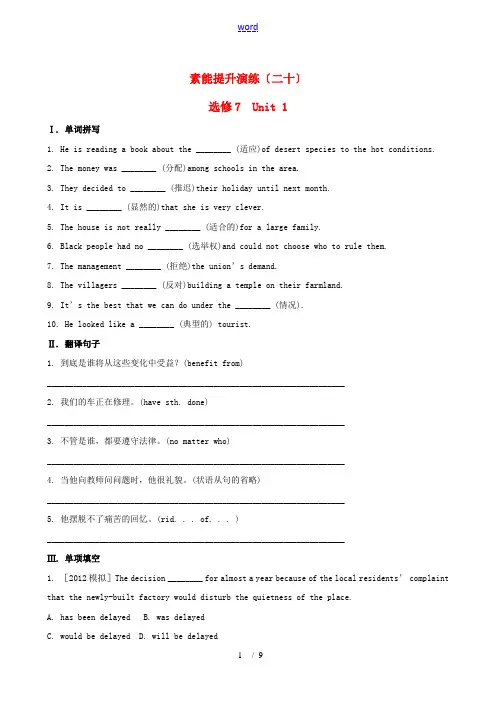
素能提升演练〔二十〕选修7 Unit 1Ⅰ. 单词拼写1. He is reading a book about the ________ (适应)of desert species to the hot conditions.2. The money was ________ (分配)among schools in the area.3. They decided to ________ (推迟)their holiday until next month.4. It is ________ (显然的)that she is very clever.5. The house is not really ________ (适合的)for a large family.6. Black people had no ________ (选举权)and could not choose who to rule them.7. The management ________ (拒绝)the union’s demand.8. The villagers ________ (反对)building a temple on their farmland.9. It’s the best that we can do under the ________ (情况).10. He looked like a ________ (典型的) tourist.Ⅱ. 翻译句子1. 到底是谁将从这些变化中受益?(benefit from)____________________________________________________________________2. 我们的车正在修理。
(have sth. done)____________________________________________________________________3. 不管是谁,都要遵守法律。
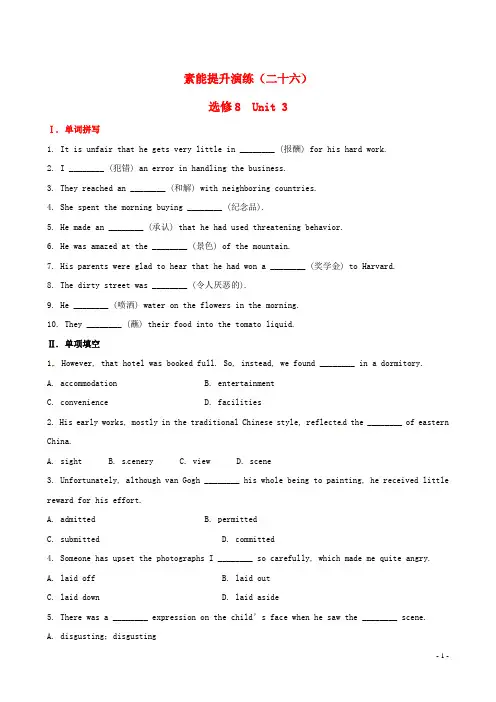
素能提升演练(二十六)选修8 Unit 3Ⅰ. 单词拼写1. It is unfair that he gets very little in ________ (报酬) for his hard work.2. I ________ (犯错) an error in handling the business.3. They reached an ________ (和解) with neighboring countries.4. She spent the morning buying ________ (纪念品).5. He made an ________ (承认) that he had used threatening behavior.6. He was amazed at the ________ (景色) of the mountain.7. His parents were glad to hear that he had won a ________ (奖学金) to Harvard.8. The dirty street was ________ (令人厌恶的).9. He ________ (喷洒) water on the flowers in the morning.10. They ________ (蘸) their food into the tomato liquid.Ⅱ. 单项填空1. However, that hotel was booked full. So, instead, we found ________ in a dormitory.A. accommodationB. entertainmentC. convenienceD. facilities2. His early works, mostly in the traditional Chinese style, reflecte d the ________ of eastern China.A. sightB. s ceneryC. viewD. scene3. Unfortunately, although van Gogh ________ his whole being to painting, he received little reward for his effort.A. admittedB. permittedC. submittedD. committed4. Someone has upset the photographs I ________ so carefully, which made me quite angry.A. laid offB. laid outC. laid downD. laid aside5. There was a ________ expression on the child’s face when he saw the ________ scene.A. disgusting;disgustingB. disgusted;disgustingC. disgusting;disgustedD. disgusted; disgusted6. The foreign visitors ________ to find that our students had such a good command of English.A. amazedB. a mazingC. were amazingD. were amazed7. [2012余姚模拟]All countries need ________ , timely and reliable climate information as well as high-quality climate services, as they will benefit the whole mankind.A. believableB. accurateC. particularD. abstract8. Can you see that this picture and the article are ________ from the same newspaper?A. cut upB. cut outC. cut downD. cut off9. Taking up a piece of soap on the table , he ________ it into water and began lathering(涂皂沫)his face.A. droppedB. dippedC. pushedD. burst10. ________ I had a few problems to deal with.A. Hardly have I arrived whenB. Hardly did I arrive thanC. Hardly had I arrived whenD. Hardly had I arrived than11. [2012西安模拟]The parents were happy to know that their son had won ________ to Beijing University.A. permissionB. allowanceC. recognitionD. admission12. [2012黄冈模拟]After hours of searching, their patience was ________ and they found what they were looking for.A.calculated B.confirmedC.rewarded D.evaluated13. It will be a long time before the Libyans heal from the ________ of the war.A. shadeB. shadowC. pictureD. scene14.[2012泰州模拟] ________ about this computer program, a huge amount of time and energ y would have been saved.A. Had I knownB. If I knewC. If I should knowD. Would I know15. I don’t know how long ________ will take the workers to build the bridge.A. itB. thatC. thisD. oneⅢ. 阅读理解[2012广州模拟]A different sort of generation gap is developing in theworkplace. Someone —specifically the father-daughter team ofLarry and Meagan Johnson — has figured out that on someAmerican job sites, five generations are working side by side.In their new book about generations in the workplace, thepair argue that while such an age difference adds a lot oftexture and a variety of life experiences, it can also bringtensions and conflicts.The Johnsons are human-resource trainers and public speakers. Dad Larry is a former health-care executive; daughter Meagan is a onetime high-level sales manager.Here are the oldest and youngest of the five generations they identify:They call the oldest group Traditionals, born before 1945. They were heavily influenced by the lessons of the Great Depression and the Second World War. They respect authority, set a high standard of workmanship, and communicate easily and confidently. But they’re also stubbornly independent. They want their opinions heard.At the other extreme are what the Johnsons call Linksters, born after 1995 i nto today’s more complicated, multi-media world. They live and breathe technology and are often socialactivists.You won’t find many 15-year-olds in the offices of large companies, except as volunteers, of course, but quite old and quite young workers do come together in sales environments like bike shops and ice-cream stores.The Johnsons, Larry and Meagan, represent a generation gap themselves in their work with jobsite issues. The Johnsons’ point is that as the average lifespan continues to rise and retirement dates get delayed because of the tight economy, people of different generations are working side by side, more often bringing with them very different ideas about company loyalty and work values.The five generations are heavily influenced by quite different events, social trends, and the cultural phenomena of their times. Their experiences shape their behavior and make it difficult, sometimes, for managers to achieve a strong and efficient workplace.Larry and Meagan Johnson discuss all this in greater detail in a new book, “Generations, Inc. : From Boomers to Linksters—Managing the Friction between Generations at Work,” published by Amacom Press, which is available in all good bookstores from this Friday.1. The type of generation gap in Paragraph 1 refers to the difference in beliefs ________ .A. between managers and workersB. among family membersC. among employeesD. between older and newer compa nies2. Which of the following statements is NOT true about Traditionals?A. They’ve learn ed much from war and economic disaster.B. They’re difficult to work with as they are stubborn.C. They respect their boss and hope to be respected.D. They’re independent workers with great confidence.3. According to the passage, the Linksters are usually ________ .A. found working in the offices of large companiesB. influenced by media and technologyC. enthusiastic multi-media activistsD. ice-cream sellers4. According to the passage, modern workforces are more diverse because ________ .A. people want to increase their average lifespanB. many young people are entering the workforceC. employees with different values can benefit their companiesD. retir ement dates are being delayed for economic reasons5. What’s the main purpose of the passag e?A. To promote a new book by Larry and Meagan Johnson.B. To describe the five different workplace generations.C. To introduce the Johnsons’ research about diverse workforces.D. To identify a major problem in modern workforces.Ⅳ. 任务型阅读[2012无锡模拟]请认真阅读下列短文,并根据所读内容在文章后表格中的空格里填入一个最恰当的单词。
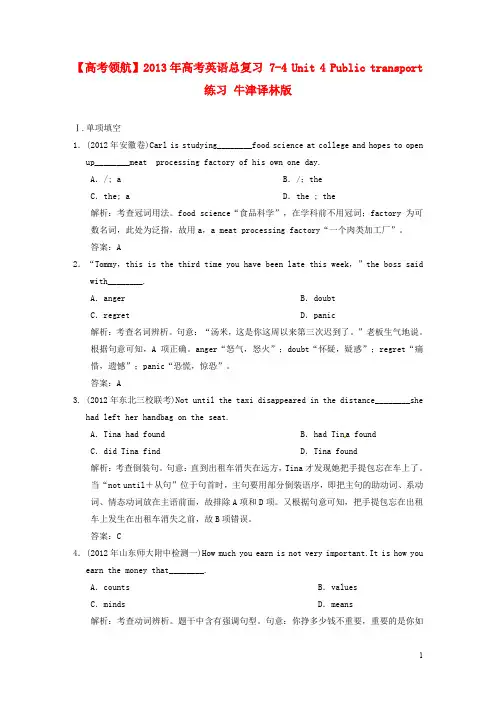
【高考领航】2013年高考英语总复习 7-4 Unit 4 Public transport练习牛津译林版Ⅰ.单项填空1.(2012年安徽卷)Carl is studying________food science at college and hopes to open up________meat processing factory of his own one day.A./; a B./;theC.the; a D.the ; the解析:考查冠词用法。
food science“食品科学”,在学科前不用冠词;factory 为可数名词,此处为泛指,故用a,a meat processing factory“一个肉类加工厂”。
答案:A2.“Tommy,this is the third time you have been late this week,”the boss said with________.A.anger B.doubtC.regret D.panic解析:考查名词辨析。
句意:“汤米,这是你这周以来第三次迟到了。
”老板生气地说。
根据句意可知,A项正确。
anger“怒气,怒火”;doubt“怀疑,疑惑”;regret“痛惜,遗憾”;panic“恐慌,惊恐”。
答案:A3. (2012年东北三校联考)Not until the taxi disappeared in the distance________shehad left her handbag on the seat.A.Tina had found B.had Tin a foundC.did Tina find D.Tina found解析:考查倒装句。
句意:直到出租车消失在远方,Tina才发现她把手提包忘在车上了。
当“not until+从句”位于句首时,主句要用部分倒装语序,即把主句的助动词、系动词、情态动词放在主语前面,故排除A项和D项。
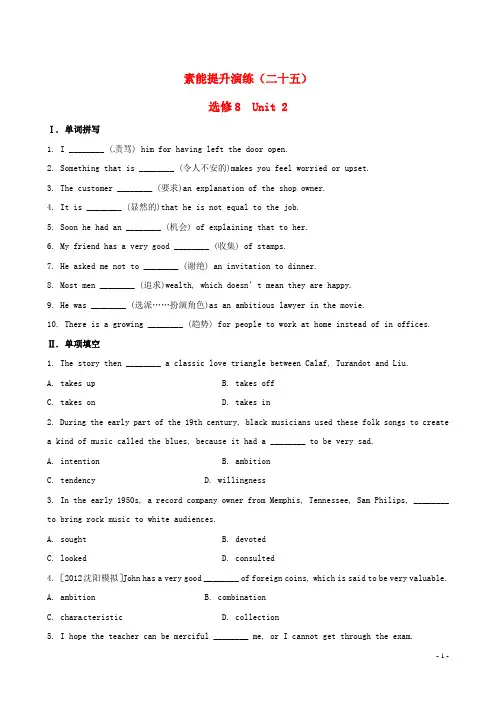
素能提升演练(二十五)选修8 Unit 2Ⅰ. 单词拼写1. I ________ (责骂) him for having left the door open.2. Something that is ________ (令人不安的)makes you feel worried or upset.3. The customer ________ (要求)an explanation of the shop owner.4. It is ________ (显然的)that he is not equal to the job.5. Soon he had an ________ (机会) of explaining that to her.6. My friend has a very good ________ (收集) of stamps.7. He asked me not to ________ (谢绝) an invitation to dinner.8. Most men ________ (追求)wealth, which doesn’t mean the y are happy.9. He was ________ (选派……扮演角色)as an ambitious lawyer in the movie.10. There is a growing ________ (趋势) for people to work at home instead of in offices. Ⅱ. 单项填空1. The story then ________ a classic love triangle between Calaf, Turandot and Liu.A. takes upB. takes offC. takes onD. takes in2. During the early part of the 19th century, black musicians used these folk songs to createa kind of music called the blues, because it had a ________ to be very sad.A. intentionB. ambitionC. tendencyD. willingness3. In the early 1950s, a record company owner from Memphis, Tennessee, Sam Philips, ________ to bring rock music to white audiences.A. soughtB. devotedC. lookedD. consulted4. [2012沈阳模拟]John has a very good ________ of foreign coins, which is said to be very valuable.A. ambitionB. combinationC. chara cteristicD. collection5. I hope the teacher can be merciful ________ me, or I cannot get through the exam.A. toB. inC. onD. at6. [2012西安模拟]Someone called me up in the middle of the night, but they hung up ________I could answer the phone.A. sinceB. whenC. untilD. before7. [2012昆明模拟]—How was the party last night?—Wonderful! I have never had a ________ one than that.A. more boringB. more enjoyableC. most enjoyableD. most bo ring8. The problem was that he didn’t know what had hurt her and he ________ her.A. dared not to askB. not dared askC. didn’t dare askD. didn’t dare asking9. [2012福州模拟]On AIDS Day, the Minister of Health Department demanded that the problems ________ paid special attention to.A. referred to beingB. referred to beC. refer to beingD. refer to be10. The president said that the situation on t he island ________ because everything happened right on the country’s borders.A. disturbedB. was disturbedC. was disturbingD. was to disturb11. Unemployment, traffic crowdedness and other problems are leading to a(n) ________ in our quality of life.A. swingB. increaseC. declineD. trend12. [2012赣州模拟]What would happen to the children if Peter and Alice ________ ?A. broke downB. broke offC. broke upD. broke into13. He ________ love with Mary for 12 years up till now.A. has fallen inB. has been inC. fell inD. is in14. This pupil is not willing to read English, which ________ him to failing in learning.A. classifiesB. associatesC. indicatesD. condemns15. [2012成都模拟]The lawyer rarely wears anything other than jeans and a T-shirt ________ the season.A. whateverB. wheneverC. whereverD. howeverⅢ.阅读理解[2012合肥模拟](A)When middle-aged Alex quit his job and made up his mind to become a self-employed writer, no one could tell for sure whether he would succeed or not. He found a cold storage room in a building, set up a used typewriter and settled down to work.After a year or so, however, Alex began to doubt himself. He found it was difficult to earn his living by selling what he wrote. But Alex determined to put his dream to the test—even though it meant living with uncertainty and fear of failure. This is the shadowland (虚幻世界) of hope, and anyone with a dream must learn to live there.One day Alex got a call, “We need an assistant, and we’re paying $ 6, 000 a year. ” $ 6, 000 was real money in 1960. It would enable Alex to get a nice apartment, a used car and more. Besides, he could write in his spare time. As the dollars were dancing in Alex’s head, something cleared his senses. He had dreamed of being a full-time writer. “Thanks, but no, ” Alex said firmly and swiftly, “I’m going to stick it out and write. ”After Alex got off the phone, he pulled out everything he had: two cans of vegetables and 18 cents. Alex put the cans and cents into a paper bag, saying to himself, “There’s everything you’ve made of yourself so far. I’m not sure I ever felt so low. ”Finally his work was published in 1970. Instantly he had the kind of fame and success thatfew writers ever experienced. The shadows had turned into focus of attention.Then one day, Alex found a box filled with things he had owned years before. Inside was a paper bag with two cans and 18 cents. Suddenly he pictured himself working in that cold storage room. It reminds Alex, and anyone with a dream, of the courage and persistence (坚毅) it takes to stay the course in the shadowland.1. Why did Alex give up his job?A. Because he didn’t like the working conditions.B. Because he couldn’t earn enough to make a living.C. Because he wanted to be a full-time writer.D. Because he felt he had no potential in his job.2. What did Alex express when he answered the call?A. He refused the job offer.B. He was willing to give them a hand.C. He expected them to pay him more money.D. He would write in his spare time.3. What kind of person is Alex?A. Determined.B. Modest.C. Shy.D. Brave.4. Which of the following can summarize the passage best?A. Look before you leap.B. Two heads are better than one.C. Hold on to your dream, and it will come true.D. A bird in hand is worth two in the bush.(B)[2012永州模拟]Walking with long steps on purpose, Barack Obama appearsto have arrived to visit an elementary school he attendedas a boy. But wait. It’s not real Obama. The US presidentis back in Washington DC.So who is this guy? He’s Ilham Anas, 34, a teen-magazine photographer who has taken advantage of his striking resemblance to Obama and turned it into his own brand of celebrity and wealth.Since his sister told him in 2007 that he looked like the then-presid ential candidate, Anas’ face and big smile have been seen on Southeast Asian TV and the Internet, appearing in the advertisements of medicine and other products. He has also shown up on his nation’s television-talk show. Anas’ resemblance to the president has turned his life around 180 degrees. He’s even written an autobiography because of Obama.Anas is the first to admit that he’s an impostor(冒牌货). But he’ll also tell you that he’s in incredible demand.“I’ve got so much work I can’t handle it all, ” he said.But when his sister first mentioned the resemblance, he dismissed it. Then a colleague at the magazine asked him to pose as Obama in front of a US flag. He also refused. “I’m a photographer, not an object for the camera, ” he said.As soon as he accepted the idea, his career took off. The married father of two children is rarely home these days. Recently a group of reporters followed him on a tour of the elementary school Obama once attended. Anas sat in the classroom where the president studied. He spoke a few lines in English. The moment he opened his mouth, however, the differences became apparent. “Obama is a baritone(男中音), ” Anas said. “I’m not. I sound like a little boy. ” He is also shorter than the president. But he makes up for that by prac tising Obama’s typical actions. Before public appearances, he spends hours in front of the mirror posing, gesturing, flashing that smile.Anas said he hasn’t changed his appearance much for the role. He wears his hair just like he did in high school. But he did shape his eyebrows to look more like those of the president. He used to dislike looking into the mirror because of his average appearance. Now he no longer considers himself as an average guy, but a superstar.Now, he hopes that Obama will win a s econd term in the White House. “The longer he’s in office, the longer my fame will last, ” he said.5. Ilham Anas becomes well-known because he ________ .A. wrote a biography for President ObamaB. looks like President ObamaC. attended the same school as President Obama used to attendD. played many roles in films6. The underlined sentence “he’s in incredible demand” means ________ .A. his advertisement business is very boomingB. he demands better pay from his bossC. he is planning to increase the productionD. he asks for higher prices for his advertisements7. Ilham Anas differs from President Obama in that Anas ________ .A. is taller than President ObamaB. is older than President ObamaC. is a baritoneD. sounds like a little boy8. We can infer that Anas now ________ .A. is proud of his appearanceB. is not satisfied with his appearanceC. often keeps in touch with President ObamaD. intends to become a politician答案解析Ⅰ. 1. scolded 2. disturbing 3. demands 4. evident 5. opportunity6. collection7. decline8. seek9. cast 10. tendencyⅡ. 1.【解析】选C。
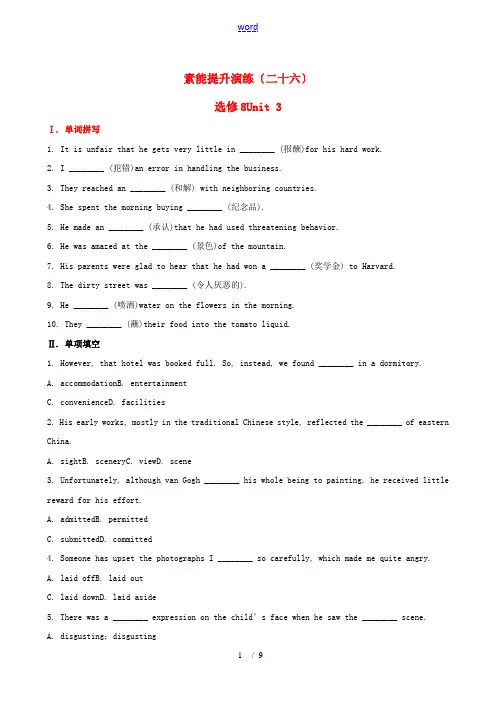
素能提升演练〔二十六〕选修8Unit 3Ⅰ. 单词拼写1. It is unfair that he gets very little in ________ (报酬)for his hard work.2. I ________ (犯错)an error in handling the business.3. They reached an ________ (和解) with neighboring countries.4. She spent the morning buying ________ (纪念品).5. He made an ________ (承认)that he had used threatening behavior.6. He was amazed at the ________ (景色)of the mountain.7. His parents were glad to hear that he had won a ________ (奖学金) to Harvard.8. The dirty street was ________ (令人厌恶的).9. He ________ (喷洒)water on the flowers in the morning.10. They ________ (蘸)their food into the tomato liquid.Ⅱ. 单项填空1. However, that hotel was booked full. So, instead, we found ________ in a dormitory.A. accommodationB. entertainmentC. convenienceD. facilities2. His early works, mostly in the traditional Chinese style, reflected the ________ of eastern China.A. sightB. sceneryC. viewD. scene3. Unfortunately, although van Gogh ________ his whole being to painting, he received little reward for his effort.A. admittedB. permittedC. submittedD. committed4. Someone has upset the photographs I ________ so carefully, which made me quite angry.A. laid offB. laid outC. laid downD. laid aside5. There was a ________ expression on the child’s f ace when he saw the ________ scene.A. disgusting;disgustingB. disgusted;disgustingC. disgusting;disgustedD. disgusted; disgusted6. The foreign visitors ________ to find that our students had such a good command of English.A. amazedB. amazingC. were amazingD. were amazed7. [2012余姚模拟]All countries need ________ , timely and reliable climate information as well as high-quality climate services, as they will benefit the whole mankind.A. believableB. accurateC. particularD. abstract8. Can you see that this picture and the article are ________ from the same newspaper?A. cut upB. cut outC. cut downD. cut off9. Taking up a piece of soap on the table , he ________ it into water and began lathering(涂皂沫)his face.A. droppedB. dippedC. pushedD. burst10. ________ I had a few problems to deal with.A. Hardly have I arrived whenB. Hardly did I arrive thanC. Hardly had I arrived whenD. Hardly had I arrived than11. [2012西安模拟]The parents were happy to know that their son had won ________ to Beijing University.A. permissionB. allowanceC. recognitionD. admission12. [2012黄冈模拟]After hours of searching, their patience was ________ and they found what they were looking for.A.calculatedB.confirmedC.rewardedD.evaluated13. It will be a long time before the Libyans heal from the ________ of the war.A. shadeB. shadowC. pictureD. scene14.[2012泰州模拟] ________ about this computer program, a huge amount of time and energy would have been saved.A. Had I knownB. If I knewC. If I should knowD. Would I know15. I don’t know how long ________ will take the workers to build the bridge.A. itB. thatC. thisD. oneⅢ. 阅读理解[2012广州模拟]A different sort of generation gap is developing in theworkplace. Someone —specifically the father-daughter team ofLarry and Meagan Johnson — has figured out that on someAmerican job sites, five generations are working side by side.In their new book about generations in the workplace, thepair argue that while such an age difference adds a lot oftexture and a variety of life experiences, it can also bringtensions and conflicts.The Johnsons are human-resource trainers and public speakers. Dad Larry is a former health-care executive; daughter Meagan is a onetime high-level sales manager.Here are the oldest and youngest of the five generations they identify:They call the oldest group Traditionals, born before 1945. They were heavily influenced by the lessons of the Great Depression and the Second World War. They respect authority, set a high standard of workmanship, and commun icate easily and confidently. But they’re also stubbornly independent. They want their opinions heard.At the other extreme are what the Johnsons call Linksters, born after 1995 into today’s more complicated, multi-media world. They live and breathe technology and are often socialactivists.You won’t find many 15-year-olds in the offices of large companies, except as volunteers, of course, but quite old and quite young workers do come together in sales environments like bike shops and ice-cream stores.The Johnsons, Larry and Meagan, represent a generation gap themselves in their work with jobsite issues. The Johnsons’ point is that as the average lifespan continues to rise and retirement dates get delayed because of the tight economy, people of different generations are working side by side, more often bringing with them very different ideas about company loyalty and work values.The five generations are heavily influenced by quite different events, social trends, and the cultural phenomena of their times. Their experiences shape their behavior and make it difficult, sometimes, for managers to achieve a strong and efficient workplace.Larry and Meagan Johnson discuss all this in greater detail in a new book, “Generations, Inc. : From Boomers to Linksters—Managing the Friction between Generations at Work,〞 published by Amacom Press, which is available in all good bookstores from this Friday.1. The type of generation gap in Paragraph 1 refers to the difference in beliefs ________ .A. between managers and workersB. among family membersC. among employeesD. between older and newer companies2. Which of the following statements is NOT true about Traditionals?A. They’ve learned much from war and economic disaster.B. They’re difficult to work with as they are stubborn.C. They respect their boss and hope to be respected.D. They’re independent workers with great confidence.3. According to the passage, the Linksters are usually ________ .A. found working in the offices of large companiesB. influenced by media and technologyC. enthusiastic multi-media activistsD. ice-cream sellers4. According to the passage, modern workforces are more diverse because ________ .A. people want to increase their average lifespanB. many young people are entering the workforceC. employees with different values can benefit their companiesD. retirement dates are being delayed for economic reasons5. What’s the main purpose of the passage?A. To promote a new book by Larry and Meagan Johnson.B. To describe the five different workplace generations.C. To introduce the Johnsons’ research about diverse workforces.D. To identify a major problem in modern workforces.Ⅳ. 任务型阅读[2012无锡模拟]请认真阅读如下短文,并根据所读内容在文章后表格中的空格里填入一个最恰当的单词。
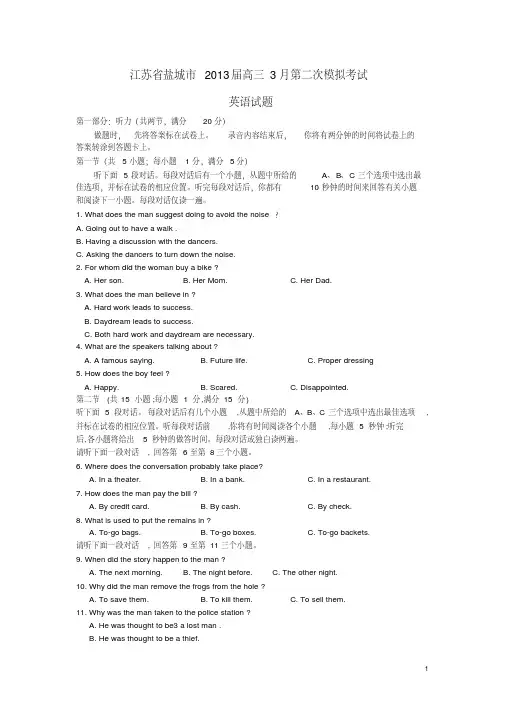
江苏省盐城市2013届高三3月第二次模拟考试英语试题第一部分:听力(共两节,满分20分)做题时,先将答案标在试卷上。
录音内容结束后,你将有两分钟的时间将试卷上的答案转涂到答题卡上。
第一节(共5小题;每小题1分,满分5分)听下面5段对话。
每段对话后有一个小题,从题中所给的A、B、C三个选项中选出最佳选项,并标在试卷的相应位置。
听完每段对话后,你都有10秒钟的时间来回答有关小题和阅读下一小题。
每段对话仅读一遍。
1. What does the man suggest doing to avoid the noise?A. Going out to have a walk .B. Having a discussion with the dancers.C. Asking the dancers to turn down the noise.2. For whom did the woman buy a bike ?A. Her son.B. Her Mom.C. Her Dad.3. What does the man believe in ?A. Hard work leads to success.B. Daydream leads to success.C. Both hard work and daydream are necessary.4. What are the speakers talking about ?A. A famous saying.B. Future life.C. Proper dressing5. How does the boy feel ?A. Happy.B. Scared.C. Disappointed.第二节(共15 小题;每小题 1 分,满分15 分)听下面 5 段对话。
每段对话后有几个小题,从题中所给的A、B、C 三个选项中选出最佳选项,并标在试卷的相应位置。
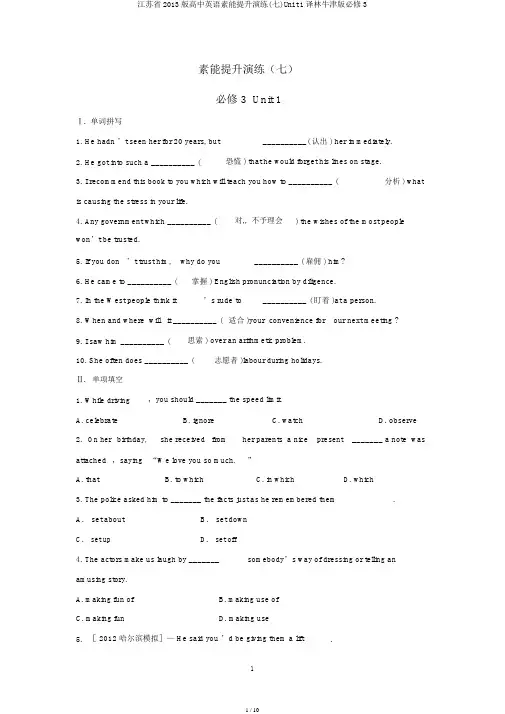
素能提升演练(七)必修 3Unit 1Ⅰ. 单词拼写1.He hadn ’t seen her for 20 years, but__________( 认出 ) her immediately.2.He got into such a __________ (恐慌 ) that he would forget his lines on stage.3.I recommend this book to you which will teach you how to __________ (分析 ) what is causing the stress in your life.4.Any government which __________ (对,,不予理会) the wishes of the most people won’t be trusted.5.If you don ’t trust him,why do you__________ ( 雇佣 ) him?6.He came to __________ (掌握 ) English pronunciation by diligence.7.In the West people think it’s rude to__________ ( 盯着 )at a person.8.When and where will it __________ ( 适合 )your convenience for our next meeting ?9.I saw him __________ (思索 ) over an arithmetic problem.10. She often does __________ (志愿者 )labour during holidays.Ⅱ.单项填空1.While driving,you should _______ the speed limit.A. celebrateB. ignoreC. watchD. observe2.On her birthday,she received from her parents a nice present_______ a note was attached,saying“We love you so much.”A. thatB. to whichC. in whichD. which3.The police asked him to _______ the facts just as he remembered them.A. set about B. set downC. set up D. set off4.The actors make us laugh by _______somebody’s way of dressing or telling an amusing story.A. making fun ofB. making use ofC. making funD. making use5.[ 2012 哈尔滨模拟]— He said you ’d be giving them a lift.—_______ There are already five people.A. Why not?B. What of it?C. Not likely.D. All right.6.—You seemed to be impressed by his skills.—Not exactly. It was his courage _______ his skills that really impressed me.A. more thanB. rather thanC. due toD. contrary to7.[ 2012吉林模拟]— Mind if I sit here?—_______.A. Suit yourselfB. Behave yourselfC. Never mindD. Help yourself8.[ 2012西宁模拟] I find painting and listening to music _______.A. relaxingB. is relaxingC. relaxedD. are relaxed9.Nearly half a million people are reported _______ their homes as a result of the disaster.A. to leave B. to be leftC. to be leaving D. to have left10.— How do you _______ your spare time?—Reading and surfing the Internet.A. employ B. take C. choose D.cost11. It doesn’t make any sense for us to_______ foreigners on public occasions, which will in turn make them _______ us.A. stare at; glare atB. look at; gaze atC. observe; glance atD. glare at; watch12. Though the accident happened in the daytime, the witnesses were very difficult _______.A. to be foundB. to findC. findingD. being found13.[ 2012 唐山模拟] I _______her voice at once on the phone, though we hadn’t seen each other for ten years.A. heardB. knewC. realizedD. recognized14.[ 2012 南京模拟] During the World Cup 2010, though the football team from Korea lost the game, the _______ crowd cheered as the players left for their homeland.A. desperateB. enthusiasticC. anxiousD. indifferent15. Whenever I ask him for help, he doesn’t_______ me, which moves me a lot.A. hesitate helping B. hesitate to helpC. bend down to help D.doubt to helpⅢ.完形填空[ 2012 南京模拟]One day I came home from school, changed my clothes and got readyfor work.I worked at a local restaurant in town as a cashier, seaterand waiter .I went to work feeling 1 . And to make matters worse,I wasbusy that evening .It ’ s the same thing over and over again,2withcustomers who complain about their food and where they are3istoo big or too small. Little things like that tend to 4 a lot ofus 5 but we manage to deal with them.Three elderly ladies walked in and sat by the windows. It happened to be the very6near where I keep the dirty 7in the boxes. Trying to keep up with all the dirty tables, customers leaving and coming in and 8 runningall over the house, it was crazy . 9 these elderly womenwere watching10I was working to make sure every table was clean and ready for the next customers.Whenthey 11 their meals, I took their plates talked to me for a while about school, how I was doing, what 12back to the kitchen.They I was inand what I planned to do in the future.13 they were leaving, they walked past me and one of them said to me ina14and gentle voice,“You are going places.” And that was it. They left the15 and I had tears in my eyes, because they gave me16to believe inmyself .They 17 my spirit from being down and gave me a18 to keep on working hard .People used to tell me that I couldn’t have a career in19until I hada degree .I’m now a co-anchor( 联合主持人 )of a student-produced television20 . And the best thing is: I’m only 17 years old and I am a senior in high school.1. A. tired B. excited C. up D.down2. A. dealing B. helping C.talking D. meeting3. A. sat B. seated C. laid D.seating 4. A. attract B. avoid C. adjust D. annoy 5. A. employees B. customersC. boss D. employers6. A. table B. box C.spot D.kitchen7. A. dishes B. rooms C. clothes D. chairs 8. A. men B. women C.servers D. bosses9. A. And B. Otherwise C. But D. So10. A. what B. how C.where D. why11. A. finished B. completedC. ordered D. got12. A. place B. grade C. mark D.position 13. A. Before B. While C. As D.After14. A. confident B. loud C. low D. pleasant15. A. kitchen B. houseC. restaurant D. table16. A. ability B. courageC. imagination D. time17. A. put down B. picked upC. took over D. pointed out18. A. cause B. reasonC. present D. permission19. A. television B. governmentC. school D. restaurant20. A. company B. stationC. show D. advertisementⅣ. 阅读理解Office workers could soon be able to do their shopping on the way to work while waiting for a train on a station platform. A“virtualsupermarket ” consisting of posters of shelves stockedwith goods put up on platform walls will be introducedat London Underground stations.Passengers“shop”by scanning QR— QuickResponse—codes of the items they want to buy using theirsmartphones. These goods are later delivered to their home address.Supermarket giant Tesco successfully trialled the hi-tech store in a SouthKorean subway station and there are now plans to bring the concept to Britain.Irene Lam,spokeswoman for Cheil Worldwide, the global marketing agency that helped develop the store,said,“In Seoul,everyone brings their smartphoneswith them all the time. Online shopping is a given and everyone is extremely busy,working very long hours. So this concept absolutely made sense.”Last month, Tesco’s Korean arm Home Plus transformed Seoul’s Hangangjin Station into a“virtual supermarket” by posting posters of stocked shelves onto platform walls.The trial increased the shopkeepe r ’s online sales by 130 percent and online members by 76 percent,claimed Cheil.Trade magazine The Grocer reported that the trial was so successful that itis now being extended to other Seoul subway stations next month, with a viewspreading the format out across South Korea within two years.And now the intending shopping experience is coming to Britain, according toexperts.“The time is absolutely right for this in the UK,” said Simon Goodall,director of strategy at Saatchi&Saatchi X.“This isn ’t about specific places — subway stations or whatever. This is about bringing the store to the people if the people won’t come to the store. It will be down to individual shopkeepersto think about how this can work for their brands.”1. What ’s the main idea of the passage?A. A new shopping experience will be introduced at London Underground stations.B. People go shopping online by telephones.C. A “virtual supermarket” appeared in Korea.D. A successful new kind of shopping.2. What can we learn according to the passage?A. A“virtual supermarket” is made up of shelves full of goods.B. The“virtual supermarket” is successful across South Korea.C. You can get the goods you buy in the“virtual supermarket” on the spot.D. Online shopping meets people ’s need according to Cheil Worldwide.3. Simon Goodall’s attitude to the“virtual supermarket”is ________.A. supportiveB. opposedC. pessimisticD. not clear答案解析Ⅰ. 1. recognized 2. panic 3. analyze 4. ignores 5. employ6. grasp7. stare8. suit9. puzzle 10. volunteerⅡ. 1.【解析】选 D。
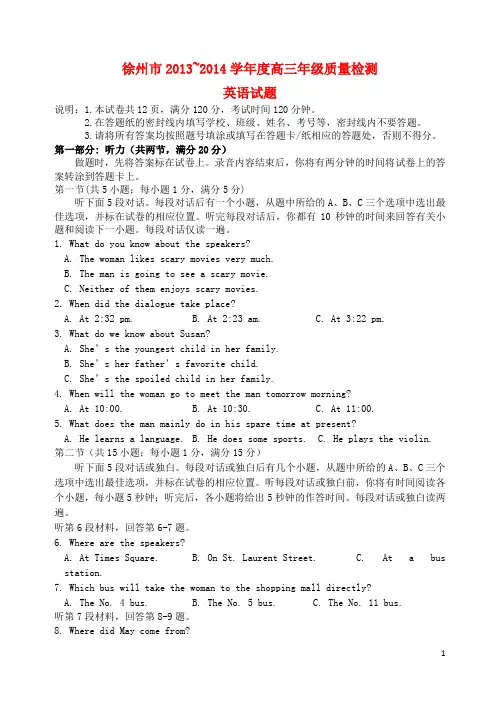
徐州市2013~2014学年度高三年级质量检测英语试题说明:1.本试卷共12页,满分120分,考试时间120分钟。
2.在答题纸的密封线内填写学校、班级、姓名、考号等,密封线内不要答题。
3.请将所有答案均按照题号填涂或填写在答题卡/纸相应的答题处,否则不得分。
第一部分: 听力(共两节,满分20分)做题时,先将答案标在试卷上。
录音内容结束后,你将有两分钟的时间将试卷上的答案转涂到答题卡上。
第一节(共5小题;每小题1分,满分5分)听下面5段对话。
每段对话后有一个小题,从题中所给的A、B、C三个选项中选出最佳选项,并标在试卷的相应位置。
听完每段对话后,你都有10秒钟的时间来回答有关小题和阅读下一小题。
每段对话仅读一遍。
1. What do you know about the speakers?A. The woman likes scary movies very much.B. The man is going to see a scary movie.C. Neither of them enjoys scary movies.2. When did the dialogue take place?A. At 2:32 pm.B. At 2:23 am.C. At 3:22 pm.3. What do we know about Susan?A. She’s the youngest child in her family.B. She’s her father’s favorite child.C. She’s the spoiled child in her family.4. When will the woman go to meet the man tomorrow morning?A. At 10:00.B. At 10:30.C. At 11:00.5. What does the man mainly do in his spare time at present?A. He learns a language.B. He does some sports.C. He plays the violin.第二节(共15小题;每小题1分,满分15分)听下面5段对话或独白。
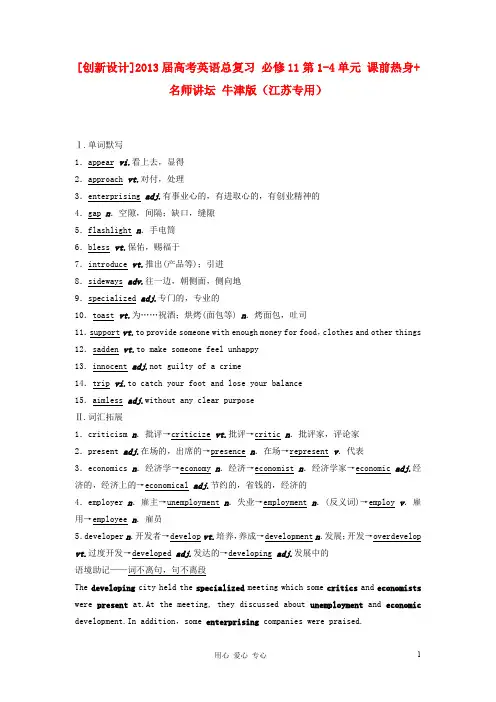
[创新设计]2013届高考英语总复习必修11第1-4单元课前热身+名师讲坛牛津版(江苏专用)Ⅰ.单词默写1.appear vi.看上去,显得2.approach vt.对付,处理3.enterprising adj.有事业心的,有进取心的,有创业精神的4.gap n.空隙,间隔;缺口,缝隙5.flashlight n.手电筒6.bless vt.保佑,赐福于7.introduce vt.推出(产品等);引进8.sideways adv.往一边,朝侧面,侧向地9.specialized adj.专门的,专业的10.toast vt.为……祝酒;烘烤(面包等) n.烤面包,吐司11.support vt.to provide someone with enough money for food,clothes and other things 12.sadden vt.to make someone feel unhappy13.innocent adj.not guilty of a crime14.trip vi.to catch your foot and lose your balance15.aimless adj.without any clear purposeⅡ.词汇拓展1.criticism n.批评→criticize vt.批评→critic n.批评家,评论家2.present adj.在场的,出席的→presence n.在场→represent v.代表3.economics n.经济学→economy n.经济→economist n.经济学家→economic adj.经济的,经济上的→economical adj.节约的,省钱的,经济的4.employer n.雇主→unemployment n.失业→employment n.(反义词)→employ v.雇用→employee n.雇员5.developer n.开发者→develop vt.培养,养成→development n.发展;开发→overdevelop vt.过度开发→developed adj.发达的→developing adj.发展中的语境助记——词不离句,句不离段The developing city held the specialized meeting which some critics and economists were present at.At the meeting, they discussed about unemployment and economic development.In addition,some enterprising companies were praised.Ⅲ.短语落实1.be suited to 合适,适宜2.go about 从事,着手做3.correspond with 与……相对应;_与……相符4.look somebody in the eye 注视(某人),直视(某人)5.make a difference 有变化,有关系,有影响,有作用6.leave_out 遗漏;省略7.be_flooded_with 被……所淹没,充满,充斥8.put_into_prison 把……投进监狱,使……坐牢9.look_through 浏览,翻阅;审阅10.land_on_one's_feet 脱离困境,摆脱困难Ⅳ.句子翻译1.These people, who perform such ordinary but vital tasks, allow people to go about their daily lives.(Page 3)就是这些做着看似普通,实际上却很重要的工作的人们使其他人能够维持各自的日常生活。
2012—2013学年度高三年级英语试题说明:1. 本试卷共12页,满分120分,考试时间120分钟。
2. 在答题纸的密封线内填写学校、班级、姓名、考号等,密封线内不要答题。
3. 请将所有答案均按照题号填涂或填写在答题卡/纸相应的答题处,否则不得分。
第一部分听力(共两节,满分20分)第一节(共5小题;每小题1分,满分5分)听下面5段对话。
每段对话后有一个小题,从题中所给的A、B、C三个选项中选出最佳选项,并标在试卷的相应位置。
听完每段对话后,你都有10秒钟的时间来回答有关小题和阅读下一小题。
每段对话仅读一遍。
1. What is Jack‘s occupation now?A. A secretary.B. A newspaperman.C. A novelist.2. Where does this conversation most likely take place?A. In a lab.B. In a clinic.C. In a dining hall.3. How old is Jane?A. 19.B. 27.C. 35.4. How often does the man go to visit his teacher?A. At least once a year.B. Once every two years.C. Twice a month.5. When will the woman sleep?A. After turning off the lights.B. After taking a walk.C. After working for a while.第二节(共15小题;每小题1分,满分15分)请听下面5段对话。
每段对话后有几个小题,从题中所给出的A、B、C三个选项中选出最佳选项,并标在试卷的相应位置。
听每段对话前,你将有时间阅读各个小题,每小题5秒钟;听完后,各小题将给出5秒钟的作答时间。
每段对话读两遍。
听第6段材料,回答第6、7题。
6. How does the man seem to feel after this job interview?A. Anxious.B. Hopeful.C. Desperate.7. How many interviewees were able to go to the second interview?A. 4.B. 12.C. 16.听第7段材料,回答第8、9题。
8. Who went on a package holiday with their kids?A. Tony and Betty.B. Tony and Julia.C. Julia and Betty.9. How did the man like the holiday?A. Comfortable.B. Wonderful.C. Disappointing.听第8段材料,回答第10至l2题。
10. Why does the man refuse the first flat?A. It‘s too expensive.B. It‘s too small.C. It‘s not on the top floor.11. Why does the woman let the man rent the second flat?A. He is clean and quiet.B. He is kind and polite.C. He is poor and honest.12. How much will the man pay before moving in?A. $100.B. $50.C. $30.听第9段材料, 回答第13至16题。
13. What is Tom doing?A. Listening to English songs.B. Surfing the Internet.C. Preparing for a test.14. How does the woman find studying English?A. Interesting.B. Boring.C. Difficult.15. What does the woman suggest the man do?A. Play more games online.B. Talk with friends online more often.C. Learn western culture online.16. What will the woman do next?A. Go to school.B. Take an exam.C. Review lessons.听第10段材料, 回答第17至20题。
17. Who is the speaker talking to?A. People showing interest in the theater.B. People working in the building.C. People visiting the university.18. What is the video showing today?A. The teachers of the university.B. The history of the theater.C. The buildings in the city.19. How soon will people meet again?A. In an hour and a half.B. In half an hour.C. In an hour.20. What is the purpose of the speaker‘s talk?A. To tell people the rules they should follow.B. To give people a brief introduction.C. To show people the direction.第二部分:英语知识运用(共两节,满分35分)第一节:单项填空(共15小题;每小题1分,满分15分)请认真阅读下面各题,从A、B、C、D四个选项中,选出可以填入空白处的最佳选项,并在答题卡上将该项涂黑。
21. It is now______ universally accepted concept that _____early education should focus onchildren‘s happiness.A. an, theB. an, 不填C. a, 不填D. the, the22. Despite being taken from very different sources, the results are remarkably _________.A. consistentB. constantC. contradictoryD. controversial23. I went to see the house, _______ at the time, the other day. But I haven‘t decide d to buy it.A. being paintedB. paintedC. to be paintedD. painting24. Disappointingly, Mr. Wang‘s lecture on Global Economy only shows that he is _____ of anexpert in any sense of the word in this field.A. noneB. nothingC. no oneD. neither25. —Do you remember when I first met you?—Of course. I__________ in a small food factory.A. workedB. was workingC. had been workingD. work26. —Mother, I climbed up to that tall tree and picked this big apple.—Jesus! You______ down and hurt yourself.A. might have fallenB. might fallC. must have fallenD. must fall27. After ten hours‘ drive, we came to ______ is called a green house, through the glass wallof _____, we saw lots of green plants.A. where, whichB. that, thatC. what, whichD. where, that28. —I don‘t understand why Jane split up with her husband.—Neither do I, especially ______ her husband was so kind and considerate towards her.A. sinceB. untilC. asD. when29. —I didn‘t expect that John would be absent from my last Sunday‘s birthday party.—As far as I know, he ______ to see his parents in the countryside on Sundays.A. goesB. wentC. has goneD. had gone30. Besides proper diet, exercise is one of the key ___________of a healthy lifestyle.A. categoriesB. componentsC. rangesD. processes31. —The lady with a baby in your arms come to take my seat in the front, _____?—Thank you.A. doesn‘t sheB. does sheC. can‘t youD. wil l you32. ______ by his fans, the movie star is always surrounded with flowers and claps wherever hegoes or appears.A. Having been lovedB. LovedC. To be lovedD. Being loved33. —Is it a fact that you helped Tom cheat in the maths exam?— Honestly, ________. Actually he sat three seats away from me and I knew nothing aboutwhat was happening.A. I think notB. it‘s not the caseC. I can‘t agree moreD. I‘m afraid not34. We are disappointed that the rainy weather has_______ a picnic for the weekend.A. ruled outB. turned outC. brought outD. taken out35. When he came back home, he found his wife with red eyes, indicating that she _________.A. criedB. has criedC. is cryingD. had been crying第二节: 完形填空(共20小题;每小题1分,满分20分)阅读下面短文,从短文后各题所给的A、B、C、D四个选项中,选出最佳选项,并在答题卡上将该项涂黑。